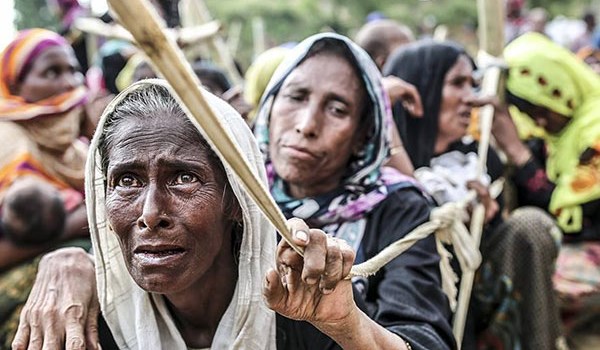
RNA - "With each passing day, the critical situation of Rohingya Muslisms becomes more complicated, the sufferings of the refugees increases, and the responsibility of countries and international organizations becomes heavier," Foreign Ministry Spokesman Bahram Qassemi said on Saturday.
"After all, the opportunity for stopping the crisis and compensating the damages is getting lost. The complicated, dire situation can turn into one of the worst humanitarian crises of the contemporary age," he added.
Despite the warnings, alarms and requests by countries, international organizations, global figures and public opinion, the Myanmar's government has turned a deaf ear to the world demands, which is unacceptable, Qassemi said.
Pointing to Iran's efforts to resolve the crisis and relieve the sufferings of displaced Myanmar people, he said that the international community should continue its measures more seriously to stop the trend of Rohingya Muslims expulsion and sending emergency humanitarian aids to them.
His remarks came after Supreme Leader of the Islamic Revolution Ayatollah Seyed Ali Khamenei strongly blasted the international bodies and those who claim to be advocates of human rights for silence on the plights and pains of Muslims in Myanmar, and called on the Islamic countries to adopt practical measures against the Myanmar government.
"Of course, religious prejudice may play a role in this incident but it is a political issue because it is executed by the Myanmar government which is headed by a cruel woman who has won the Nobel prize, and actually the Nobel Peace Prize died with such incidents," Ayatollah Khamenei said earlier this month.
He lashed out at the UN secretary-general who has only sufficed to the condemnation of the crimes in Myanmar, and said, "Those who claim to be advocates of human rights and start hues and cries sometimes for punishment of a guilty person in Iran, don’t show any reaction to the massacre and displacement of tens of thousands of people in Myanmar."
Ayatollah Khamenei underlined the need for the Islamic governments' action and practical measures, and said, "Of course, practical action doesn’t mean deployment of military forces but they should increase political, economic and trade pressures on Myanmar government and shout against such crimes in the international circles."
The Rohingya Muslims in Myanmar have long been subjected to discrimination in Buddhist-majority country, which denies them citizenship.
Myanmar's government regards them as illegal migrants from Bangladesh, even if they have lived in the country for generations.
Refugee camps near Bangladesh's border with Myanmar already had about 300,000 Rohingya before the upsurge in violence last month and are now overwhelmed.
Tens of thousands of new arrivals have nowhere to shelter from monsoon rains.
Those flocking into Bangladesh have given harrowing accounts of killings, rape and arson by Myanmar's army. Myanmar authorities deny any wrongdoing.
Most have walked for days and the UN says many are sick, exhausted and in desperate need of shelter.
847/940